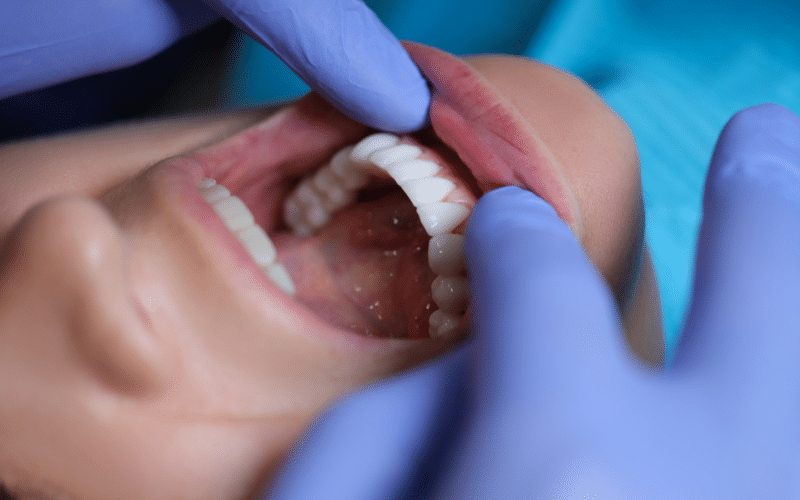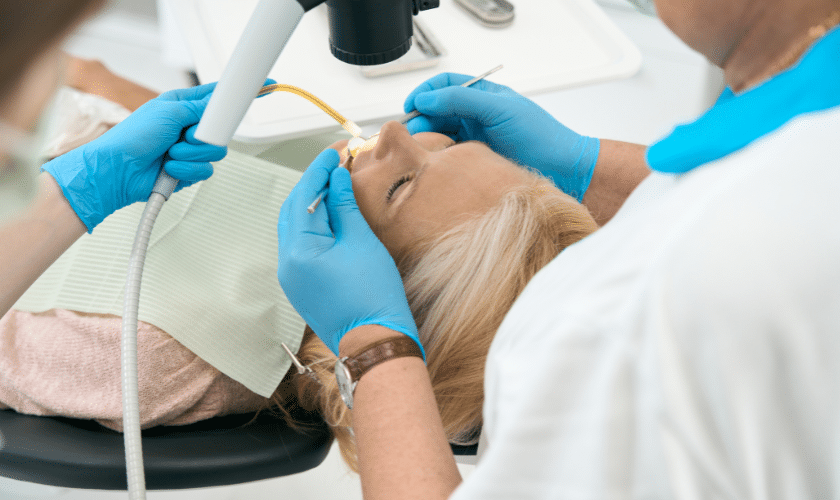ONLINE SCHEDULING AND VIRTUAL CONSULTS AVAILABLE

Did You Know Oral Surgery Can Fix These Issues?

Have you ever considered the breadth of problems that oral surgery can resolve? Oral surgery in Plantation, FL, encompasses a wide range of procedures that can address various issues affecting your oral health. From jaw misalignment to sleep apnea, the field of oral surgery holds the key to solving many surprising problems. In this blog, we’ll delve into the transformative potential of oral surgery, exploring some lesser-known issues it can effectively fix.
The Oral Surgery procedure
Oral surgery in Plantation, FL, is a specialized branch of dentistry that involves surgical procedures to diagnose and treat conditions affecting the mouth, jaw, and face. From routine tooth extractions to complex reconstructive surgeries, oral surgeons are trained to address various oral and facial issues. Here’s what you can expect from this procedure:
Initial Consultation and Examination
The oral surgery process typically begins with an initial consultation and examination. During this visit, the oral surgeon will review the patient’s medical and dental history. Also, they will perform a thorough oral examination, and order diagnostic tests such as X-rays or CT scans to assess the condition in detail. This step is crucial for developing a personalized treatment plan tailored to the patient’s needs.
Treatment Planning
Based on the findings from the examination, the oral surgeon will develop a comprehensive treatment plan. This involves outlining the recommended procedures and their sequence. The treatment plan will take into account factors such as the severity of the condition, the patient’s overall health, and any specific concerns or preferences they may have. Clear communication between the patient and the oral surgeon is essential during this stage to ensure that all questions are addressed and the patient feels comfortable with the proposed treatment.
Preparation for Surgery
Before the oral surgery procedure, the patient will receive instructions on how to prepare. This may include fasting for a certain period before surgery and avoiding certain medications that can increase the risk of bleeding. Patients undergoing sedation or general anesthesia will also receive specific guidelines to follow to ensure their safety and comfort during the procedure.
The Surgical Procedure
The specific steps of the oral surgery procedure will vary depending on the nature of the condition being treated. Some common oral surgery procedures include:
Tooth Extraction: This involves removing one or more teeth that are damaged, decayed, impacted, or causing overcrowding. The oral surgeon will carefully extract the tooth using specialized instruments and techniques to minimize trauma to the surrounding tissues.
Dental Implant Placement: Dental implants are used to replace missing teeth and restore function and aesthetics. The oral surgeon will surgically place the implant into the jawbone, where it will integrate with the surrounding bone tissue over time to provide a stable foundation for a prosthetic tooth or crown.
Jaw Surgery (Orthognathic Surgery): Jaw surgery may be recommended to correct jaw misalignment (malocclusion) that affects bite function, speech, and facial aesthetics. The oral surgeon will reposition the jaws using specialized techniques, such as cutting and realigning the bones, to achieve optimal alignment and harmony of the facial features.
Soft Tissue Procedures: Oral surgery can also involve soft tissue procedures to treat conditions such as gum disease and oral lesions or to improve the aesthetics of the smile. This may include procedures like gum grafting, frenectomy, or removal of oral tumors.
Surprising Issues Oral Surgery Can Address
While many people associate oral surgery with routine procedures like tooth extractions or dental implants, the field encompasses a diverse range of treatments that can address surprising and sometimes overlooked issues. Here are some lesser-known problems that oral surgery in Plantation, FL, can effectively fix:
Jaw Misalignment (Malocclusion):
Malocclusion, or jaw misalignment, can lead to a host of issues beyond just cosmetic concerns. Severe malocclusion can affect chewing function and speech and even lead to temporomandibular joint (TMJ) disorders. Orthognathic surgery, a type of oral surgery, can correct misaligned jaws by repositioning the upper and lower jaws. As a result, it improves the aesthetic appearance of the face and enhances bite function and overall oral health.
Sleep Apnea:
While sleep apnea is often associated with obesity and airway obstruction, certain anatomical factors in the mouth and throat can also contribute to the condition. Oral surgery procedures such as uvulopalatopharyngoplasty (UPPP) can effectively treat obstructive sleep apnea. This procedure involves removing excess tissue from the throat, or maxillomandibular advancement, which repositions the jaw to widen the airway. By addressing the underlying structural issues, oral surgery can significantly improve sleep quality and reduce the risk of associated health problems.
Cleft Lip and Palate Repair:
Cleft lip and palate are congenital conditions that occur when the tissues of the lip and palate fail to fuse properly during fetal development. These conditions not only affect facial appearance but can also lead to difficulties with feeding, speech, and dental development. Oral surgery plays a crucial role in repairing cleft lip and palate, restoring both function and aesthetics. Surgeons use advanced techniques to close the aperture and reconstruct the affected areas, allowing patients to lead healthy, fulfilling lives.
Facial Trauma Reconstruction:
Facial trauma resulting from accidents, sports injuries, or assaults can cause significant damage to the bones and soft tissues of the face. Oral surgeons are trained to perform complex facial trauma reconstruction procedures. This includes bone grafting, soft tissue repair, and dental implant placement. These surgeries not only restore the structural integrity of the face but also improve facial aesthetics and function. As a result, it helps patients regain their confidence and quality of life.
Impacted Teeth and Dental Misalignment:
Impacted teeth, such as wisdom teeth that fail to emerge properly, can cause pain, infection, and dental misalignment. Oral surgery, particularly tooth extraction, is often necessary to remove impacted teeth and prevent complications. Additionally, oral surgery procedures like orthodontic surgery can address severe dental misalignments that are not effectively corrected with braces alone.
Oral Pathology and Tumor Removal:
Oral surgeons are trained to diagnose and treat various oral pathology conditions, including oral tumors and lesions. Sometimes, surgical removal of the tumor might be necessary to prevent further growth and ensure the patient’s health. Oral surgery procedures for tumor removal may involve excision of the affected tissue. This also involves the reconstruction of the surgical site, and follow-up care to monitor for recurrence.
The field of oral surgery in Plantation, FL, extends far beyond simple tooth extractions, encompassing a diverse array of procedures. These procedures are aimed at addressing a wide range of oral and facial issues. From correcting jaw misalignment to reconstructing facial trauma, oral surgeons play a vital role in improving the function, and aesthetics of your mouth. By understanding the surprising problems oral surgery can fix, individuals can make informed decisions about their oral health care. Also, you can seek appropriate treatment when needed. Oral surgery offers solutions that can enhance your quality of life and restore your confidence in your smile. So, please schedule an appointment at My Dentist For Life Of Plantation to get valuable insights about oral surgery.




